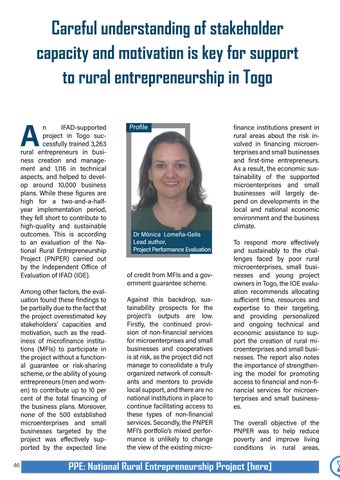Careful understanding of stakeholder capacity and motivation is key for support to rural entrepreneurship in Togo
A
n IFAD-supported project in Togo successfully trained 3,263 rural entrepreneurs in business creation and management and 1,116 in technical aspects, and helped to develop around 10,000 business plans. While these figures are high for a two-and-a-halfyear implementation period, they fell short to contribute to high-quality and sustainable outcomes. This is according to an evaluation of the National Rural Entrepreneurship Project (PNPER) carried out by the Independent Office of Evaluation of IFAD (IOE). Among other factors, the evaluation found these findings to be partially due to the fact that the project overestimated key stakeholders’ capacities and motivation, such as the readiness of microfinance institutions (MFIs) to participate in the project without a functional guarantee or risk-sharing scheme, or the ability of young entrepreneurs (men and women) to contribute up to 10 per cent of the total financing of the business plans. Moreover, none of the 500 established microenterprises and small businesses targeted by the project was effectively supported by the expected line
46
Profile
Dr Mònica Lomeña-Gelis Lead author, Project Performance Evaluation
of credit from MFIs and a government guarantee scheme. Against this backdrop, sustainability prospects for the project’s outputs are low. Firstly, the continued provision of non-financial services for microenterprises and small businesses and cooperatives is at risk, as the project did not manage to consolidate a truly organized network of consultants and mentors to provide local support, and there are no national institutions in place to continue facilitating access to these types of non-financial services. Secondly, the PNPER MFI’s portfolio’s mixed performance is unlikely to change the view of the existing micro-
finance institutions present in rural areas about the risk involved in financing microenterprises and small businesses and first-time entrepreneurs. As a result, the economic sustainability of the supported microenterprises and small businesses will largely depend on developments in the local and national economic environment and the business climate. To respond more effectively and sustainably to the challenges faced by poor rural microenterprises, small businesses and young project owners in Togo, the IOE evaluation recommends allocating sufficient time, resources and expertise to their targeting, and providing personalized and ongoing technical and economic assistance to support the creation of rural microenterprises and small businesses. The report also notes the importance of strengthening the model for promoting access to financial and non-financial services for microenterprises and small businesses. The overall objective of the PNPER was to help reduce poverty and improve living conditions in rural areas,
PPE: National Rural Entrepreneurship Project [here]
















